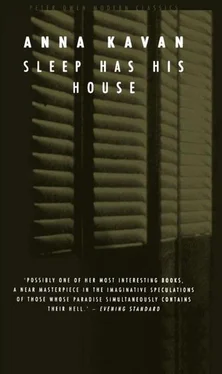Who has not, when walking in an unfamiliar part of the town, felt one of those sudden queer psychological shocks which dart like arrows, like premonitions, out of the blue? One may be hurrying along thinking about some personal matter or about an important appointment ahead. All at once, quite without rhyme or reason, the thread of thought snaps, one looks up and sees a big dingy building on the other side of the street, a warehouse possibly, or an old-fashioned office block, which seems to be empty because the shutters are all closed and scraps of paper and leaves have blown on to the dusty doorstep. It’s the sort of unattractive unremarkable place you might pass a hundred times without noticing; but today it catches your eye just as an importunate beggar might catch hold of your sleeve. After all it isn’t deserted, because between the slats of the shutters dim lights are gleaming. And suddenly the idea comes into your head that perhaps now, at this very moment while you are passing by, in one of the rooms behind those drab shutters, at a worm-eaten desk, among bundles of papers tied up with red or green tape, with scratchy old-fashioned pen-strokes, your fate is being inscribed.
Or something like this may happen while you are out for a walk in the country: you feel yourself quite alone, for an hour you haven’t seen one living creature, not even a dog or a horse in a field, you seem to be miles from anywhere. And then in this solitude, out of the bushes at the side of the road, a sly face looks out at you, the face of an old man with a beard and a big hat such as is seldom worn these days. Just for a second he looks out at you. It’s really surprising to meet anyone in such a lonely place; but instead of saying Good day, he draws back, disappears into the wood, and you don’t see him again. What is it makes you feel that this old man has been watching you, perhaps following you for some time, hidden among the trees: that he has perhaps been sent to that out-of-the-way spot on purpose to see and report afterwards which track you are following, whether you turn to the right or the left at the crossroads at the foot of the hill?
Nobody knows the exact significance of these feelings which all of us have experienced: but that they bear some relation to our close surveillance by the authorities appears certain. If only it were possible to find out something definite. One feels under constant observation. One has the conviction that every trifling act is noted and set down either against one or in one’s favour. And at the same time one hasn’t the faintest clue to the standards by which one is being judged. How is it possible to avoid anxiety and indecision when a move of any kind involves the whole of one’s future status?
Well, it’s no good trying to take matters into our own hands; nor is it much good consulting anyone else. All we can do is walk circumspectly and hope for the best; always remembering that whole trains of unimaginable events may follow some incident which seems quite trivial to us, such as, for example, the act of telephoning instead of writing a letter to someone we know.
When everything’s said and done, unfortunately, we find ourselves in the position of children whose parents have gone to the theatre, leaving them alone in the dark house. Yes, we are forced, if we are honest, to make the saddest of all admissions when it comes to the last resort: Alas, we do not understand these things.
What ages it took us to get to the end of our journey. At times it seemed as if we never should arrive anywhere, but spend our whole lives travelling. The natives of the countries we passed through must have thought us a funny lot, all of us wearing the same face (though our sizes were different, and our clothes too, of course). Some of us would have liked to settle down in one of these countries, some in another. And I think we all occasionally wished in our secret hearts that we’d never embarked on the expedition. But we couldn’t go back once we had started. There was nothing for it but to keep moving on, even if we didn’t know where we were going. It wasn’t a pleasure trip at any stage; but sometimes the going was terribly hard and slow and exhausting; those were the times when we tried to keep up our spirits by singing. We don’t know where we’re going, we sang then, but we’re on our way. We got discouraged though, all the same, however loudly we sang.
Besides the hardships of the journey itself, there was the isolation and the uncertainty about what we should find at the end of it, supposing we ever did get to our destination. It was impossible not to feel anxious from time to time, and homesick, as well. How could we help remembering the place where we’d lived long ago, where people were kind and smiling? How could we help reflecting that the smiles and the kindness would have been still there for us to enjoy if we hadn’t been so independent? We used to think of that place always flooded with summer sunshine, while we were travelling far away in stony forgotten regions under a winter sky.
It was winter when we arrived at a place which we thought at first was the right one. The inhabitants came out to meet us and took us in: they took our arms and took us inside walls, and then we saw that the windows were barred and that the doors could not be opened. We became frightened, smelling the caged smell that was in the place, and seeing the locked garden where men with dead eyes swept the unfallen leaves. We saw sleepers laid out in a mass-grave, and officials going amongst them with sleep in their hands. We were more frightened then, we looked at one another and whispered, What kind of sleep is this? knowing now that certainly we had not reached the right destination.
From there we escaped finally, and travelled farther, and in the end we arrived, in spite of all the obstacles. How glad we were to think we had got to our own place! How glad we were to be able to rest at last! Yes, it seems wonderful that the dangers are all behind us. But even now we sometimes wonder about things, and think of the lost sun and the smiles that we knew in the beginning. We suffered much in avoiding those treacherous smiles: we passed through many trials to escape that traitorous sun.
Now we are safe at last. We are secure. We are at peace. But even in the midst of the security and the peace… Still, at certain moments… we wonder, secretly, if it was worth it… if peace and security are really worth the splendour they cost to buy.
It is night; and there is nothing false here. Night is reliable. Night does not dazzle us with treacherous fires. Night keeps a dark enduring silence for us… like sleep, deep sleep. By our own will we came here and tasted sleep before there was any need, because we loved to gaze at the face of night. But not quite at home… even among loved shadows… we can’t forget altogether the splendid sun… we sometimes have to dream of the place we came from.
The blissful eye, conscientiously keeping an eye on everything in its turn, takes a turn at eyeing microbic matters, applies itself to the eyepiece (microscope by Negretti and Zambra), and makes a leisurely tour of the slide-wide situation.
A peaceful pastoral scene is here displayed on the fluorescent field, quite in order and as it should be, unexciting, of course, but who is not prepared to sacrifice whatsit to whatsit these days? There is, we think, general agreement that we all have to face a period of whatsit and lessened whatsit for some time to come.
In addition to those of us who are actively engaged in one of the whatsits, very many other people are turning towards whatsit as an outlet for their thoughts and energies, and either as a means of increasing whatsit for whatsit motives, or as a whatsit to take the place of other whatsits not now within their reach.
There is no more gratifying sight for the enthusiast than a contented culture of healthy whatsits placidly browsing upon the pabulum scientifically prepared by those who have studied whatsits and understand the many problems which may cause anxiety.
Читать дальше












